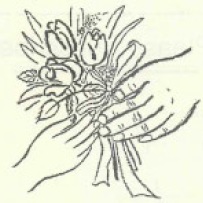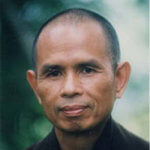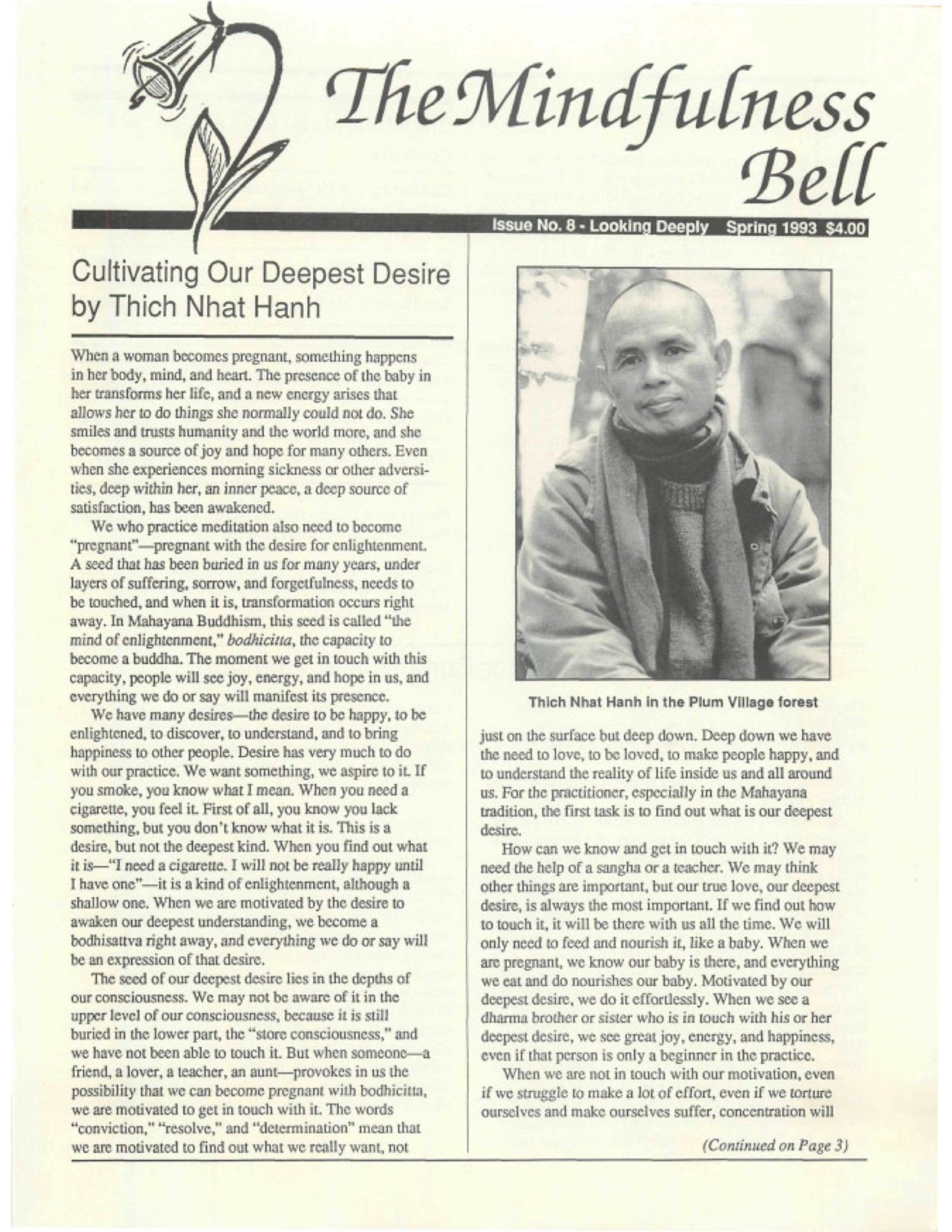By Thich Nhat Hanh in March 1993
The following proposal has been offered by Thich Nhat Hanh for bringing about reconciliation between the government of Vietnam and the Vietnamese Buddhists.
1. Protecting our Nation’s Nature-Heritage (Preserving our Mother’s Body):
As Vietnamese students of the Buddha, we make a vow to protect the wholeness of the territory of Vietnam, which means to protect the soil, the mountains,
By Thich Nhat Hanh in March 1993
The following proposal has been offered by Thich Nhat Hanh for bringing about reconciliation between the government of Vietnam and the Vietnamese Buddhists.
1. Protecting our Nation's Nature-Heritage (Preserving our Mother's Body):
As Vietnamese students of the Buddha, we make a vow to protect the wholeness of the territory of Vietnam, which means to protect the soil, the mountains, the forests, the rivers, the ocean, and the air. We vow to do everything that we can to protect the environment, to protect every species of animal and plant life in the country of Vietnam. We vow to stop the pollution and destruction of the nature-heritage of Vietnam. As Vietnamese Buddhists we call on our compatriots, our government, and all those who are friends of Vietnam anywhere in the world to make a contribution to this task of protecting the Vietnamese environment. We expect that efforts to develop agriculture and industry, investments abroad, and the exploitation of resources will be founded on the principal of protecting our nature-heritage.
The protection of life is a practice observed by all Buddhists. Life here means not only the life of human beings, but also the life of all animal, plant, and mineral species. The Diamond Sutra teaches that the human race cannot exist if there is destruction of the animal, plant, and mineral species. Anyone living anywhere on this planet, if they are aware of the state of our planet Earth at this present time, will look at the world and act in accord with this principle.
2. Protecting the Cultural Heritage of Our People (As the Bird Has its Nest, so a Person Has Ancestors).
As Vietnamese students of the Buddha, we vow to bear in mind the happiness established for us by our ancestors. We are determined not to abandon the cultural roots and traditions of our ancestors and our people. All of our cultural heritage— whether architecture (our pagodas, village meeting houses, villages, tombs, non-Buddhist temples and churches), literature, poetry, music, dance, customs, or dress—need to be respected, preserved, and cared for so that all our people, now and in the future, may be in touch with our traditional culture. We call on our compatriots, our government, and all those who are friends of Vietnam anywhere in the world to contribute their energy to this work of protecting our culture. New ways of thought, new ways of life, and new forms of religious belief should be introduced in the spirit of respecting and protecting our cultural heritage.
People of our age suffer and feel alienated because they have cut off all contact with their cultural roots. As Vietnamese Buddhists we call for a return to the source in order to rediscover a feeling of confidence in the value of our traditional culture, to foster that value, and to enrich it. An individual is not a separate, self-dependent entity, but a continuation of the ancestral line, tradition, and culture. This fact is a reflection of the awareness of the teachings of interdependent origination and selflessness in Buddhism.
Anyone whosoever living anywhere on this planet earth, if they are aware of the slate of separation and alienation of people of our time, will look at the world and act in accord with this principle.

3. Vietnamese Buddhists Have No Enemies (Only Love and Compassion Can Put an End to Hatred)
Vietnamese students of the Buddha wish to live in peace in their own hearts and at peace with all other sectors of the Vietnamese people, without discriminating according to race, creed, and ideology, as long as they all share the willingness to protect the nature and the cultural heritage of our land. As Vietnamese Buddhists, we look on every Vietnamese person as a brother or a sister and do not consider anyone to be an enemy. We make the vow to contribute to the overcoming of all rivalries and resolving all misunderstandings between different sectors of our people. We appeal for understanding and forgiveness of mistakes which we have caused each other in the past in order to contribute together to building the present and the future. It is our earnest desire to have peace and joy in our hearts by living in harmony with the Confucian, Taoist, Christian, Cao Dai, Hoa Hao, and any other religious traditions of our people.
Recognizing that no one is our enemy is one of the basic teachings of Buddhism. This recognition is also enshrined in all the great spiritual, humanist, and religious traditions of the world.
4. Buddhism as Engaged and Unified.
As Vietnamese students of Buddhism, we wish to have a unified congregation including all the Buddhists of Vietnam. The Unified Buddhist Church of Vietnam (founded in 1964) and the Buddhist Church of Vietnam (founded in 1981) need to unite in order to combine all the good and beautiful things that are available in these two churches. A unified church of all Vietnamese Buddhists has to be independent, autonomous, and not subject to government interference in its internal affairs.
The Unified Buddhist Church of Vietnam, which was founded in 1964, was one of the outstanding achievements of Vietnamese Buddhists after countless struggles which cost many tears and many lives. Such a church is truly a church of the people. Such a church has to be recognized by by the people, and by the government. The performance and the strong points of such a church must be ed wholeheartedly by a unified Buddhist congregation Buddhists in Vietnam.
5. Vietnamese Buddhism Has no Political Objective.
As The Unified Buddhist Church of all Vietnamese Buddhists is determined to stay in the field of religious practice. All the teaching and practice activities of Vietnamese Buddhists are to heal the deep wounds of individuals, families, and society; to transform the suffering, hatred, and anger so that people will be able to accept, love, and embrace each other. We reject the path of seeking power, the manipulation of political power, or engagement in partisan politics.
6. The Real Needs of Present-Day Buddhism in Vietnam
As Vietnamese students of the Buddha, we expect the right to practice and teach in freedom as religion is practiced in the free countries of the world, which involves:
- The freedom to publish and circulate Buddhist sutras, books, and journals
- The freedom to found institutes of all levels of Buddhist studies.
- The freedom to found centers of study and practice for both laypeople and monks and nuns.
- The freedom to organize ceremonies, teachings, and sessions of practice.
- The freedom to practice relief work in society as a way of realizing love and compassion.
- Vietnamese Buddhists demand that all imprisoned monks be set free.
- Vietnamese Buddhists demand the return of all establishments belonging to the Unified Buddhist Church that have been confiscated.
- Monks and nuns have the right to go abroad in order to study, make contacts, practice, and teach.
- All monks, nuns, and practitioners abroad have the right to come home to Vietnam to practice and to teach.
- All the important figures of the Council of Elders and the Executive Council of the Unified Buddhist Church be allowed to return to their former positions of responsibility in the Unified Buddhist Church of all Vietnamese Buddhists


